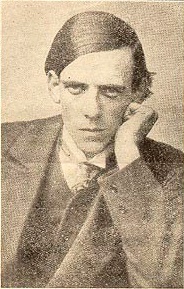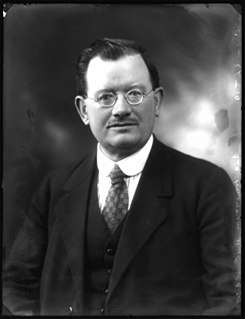
At the beginning of 1914 the British Army had a reported strength of 710,000 men including reserves, of which around 80,000 were regular troops ready for war. By the end of the First World War almost 1 in 4 of the total male population of the United Kingdom of Great Britain and Ireland had joined up, over five million men. Of these, 2.67 million joined as volunteers and 2.77 million as conscripts. Monthly recruiting rates for the army varied dramatically.

The Independent Labour Party (ILP) was a British political party of the left, established in 1893, when the Liberals appeared reluctant to endorse working-class candidates, representing the interests of the majority. A sitting independent MP and prominent union organiser, Keir Hardie, became its first chairman.

James Maxton was a British left-wing politician, and leader of the Independent Labour Party. He was a pacifist who opposed both world wars. A prominent proponent of Home Rule for Scotland, he is remembered as one of the leading figures of the Red Clydeside era. He broke with Ramsay MacDonald and the second minority Labour government, and became one of its most bitter critics. As the leader of the Independent Labour Party (ILP), he disaffiliated the ILP from the mainstream party in 1932. Afterwards, he became an independent dissident outside front-line politics.

John Wheatley was a Scottish socialist politician. He was a prominent figure of the Red Clydeside era.
Red Clydeside was the era of political radicalism in Glasgow, Scotland, and areas around the city, on the banks of the River Clyde, such as Clydebank, Greenock, Dumbarton and Paisley, from the 1910s until the early 1930s. Red Clydeside is a significant part of the history of the labour movement in Britain as a whole, and Scotland in particular.

Archibald Fenner Brockway, Baron Brockway was a British socialist politician, humanist campaigner and anti-war activist.
The Union of Democratic Control was a British pressure group formed in 1914 to press for a more responsive foreign policy. While not a pacifist organisation, it was opposed to military influence in government.

John Turner Walton Newbold, generally known as Walton Newbold, was the first of the four Communist Party of Great Britain members to be elected as MPs in the United Kingdom.

Reginald Clifford Allen, 1st Baron Allen of Hurtwood, known as Clifford Allen, was a British politician, leading member of the Independent Labour Party (ILP), and prominent pacifist.

The Glasgow Camlachie by-election was held on Wednesday 28 January 1948, following the death of the sitting Member of Parliament, Campbell Stephen.

Opposition to World War I included socialist, anarchist, syndicalist, and Marxist groups on the left, as well as Christian pacifists, Canadian and Irish nationalists, women's groups, intellectuals, and rural folk.
The Labour Leader was a British socialist newspaper published for almost one hundred years. It was later renamed New Leader and Socialist Leader, before finally taking the name Labour Leader again.

The Working Class Movement Library (WCML) is a collection of English language books, periodicals, pamphlets, archives and artefacts, relating to the development of the political and cultural institutions of the working class created by the Industrial Revolution, in Salford, Greater Manchester, England.
Edward Frank Wise CB was a British economist, civil servant and Labour Party politician. He served as a Member of Parliament (MP) from 1929 to 1931.

The No-Conscription Fellowship was a British pacifist organization which was founded in London by Fenner Brockway and Clifford Allen on 27 November 1914, after the First World War had failed to reach an early conclusion. Other prominent supporters included John Clifford, Bruce Glasier, Hope Squire, Bertrand Russell, Robert Smillie and Philip Snowden.
Forward was a socialist newspaper published in Scotland from 1906.

The Merthyr Pioneer was a weekly Socialist newspaper founded by Keir Hardie that was published in Merthyr Tydfil, Wales, from 1911 to 1922. The newspaper was a successful local paper, and also served as a vehicle for communicating Hardie's political opinions.
Clement James Bundock was a British trade union leader, newspaper editor and political activist.
John William Kneeshaw was a British political activist.
Marjory Newbold was a leading Scottish socialist and communist, prominent in the Independent Labour Party and in the 'Red Clydeside' movement demanding reforms for the working class. Newbold organised pacifist and Marxist activism in 1917 - 1920s across the UK, and was one of the first British people to visit Russia after the revolution when she travelled incognito into Russia with delegates including Sylvia Pankhurst, to the Second World Congress of the Comintern.












